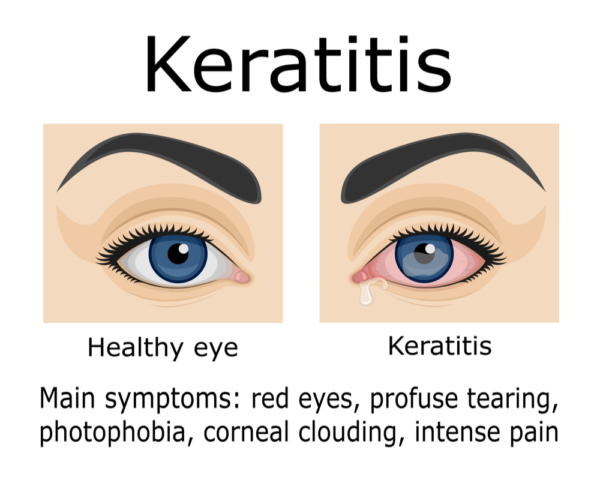Bacterial keratitis is a serious infection of the cornea and is often referred to as a ‘corneal ulcer’. Symptoms include reduced vision, light sensitivity, pain and excessive tearing or discharge from your eye. It is typically caused by contact lens use (especially, overnight wear and inadequate lens disinfection), but may be also be caused by:
- Using contaminated eye medicine or other solutions in the eye
- Recent corneal disease
- Reduced immunity due to diabetes, poor nutrition, or alcoholism
- Trauma or injury of the eye
- Use of topical steroids
The types of bacteria responsible for a keratitis infection:
- Staphylococcus Aureus (contact lens wearers)
- Pseudomonas Aeruginosa
Bacterial keratitis can involve the uppermost layers of the cornea “superficial bacterial keratitis” or, affect deeper corneal layers “deep bacterial keratitis”. When superficial keratitis heals, there is usually no scar left on the cornea.
In severe cases of deep bacterial keratitis where the center of the cornea is affected, decreased vision may result – there are cases where corneal transplantation may be needed to restore vision.
When diagnosing a bacterial keratitis eye infection, your ophthalmologist will perform a complete ophthalmic examination which may include gently scraping the cornea to take a small sample of material to test it for infection and to determine whether microorganisms are responsible. Treatment for bacterial keratitis typically includes frequent antibiotic drops to the eye. In addition, multiple visits to your ophthalmologist may be needed and you may be asked to discontinue wearing contact lenses until you are fully healed.
Bacterial keratitis usually develops very quickly. If you should experience any of the symptoms of bacterial keratitis, especially sudden pain, you need to see an ophthalmologist immediately to begin treatment to prevent possible blindness.
Make an appointment with Fort Lauderdale Eye Institute today!







